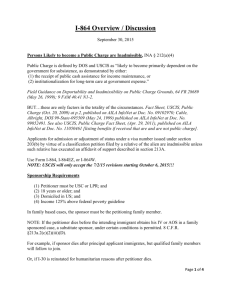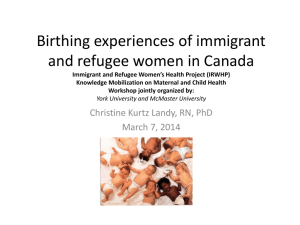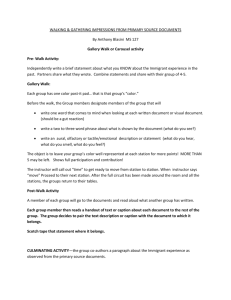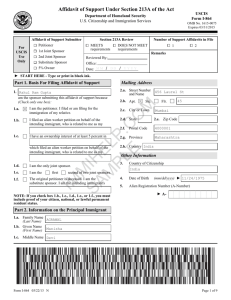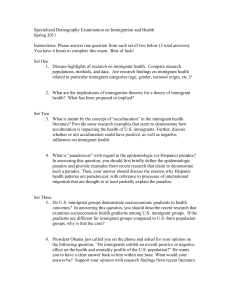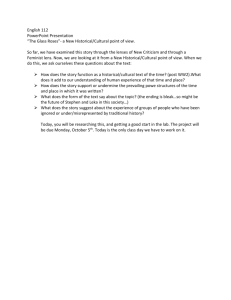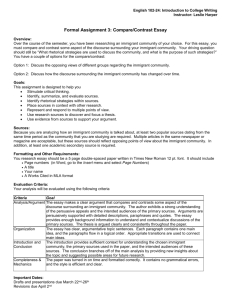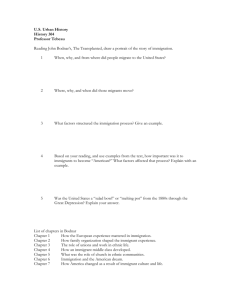I-864 instr
advertisement
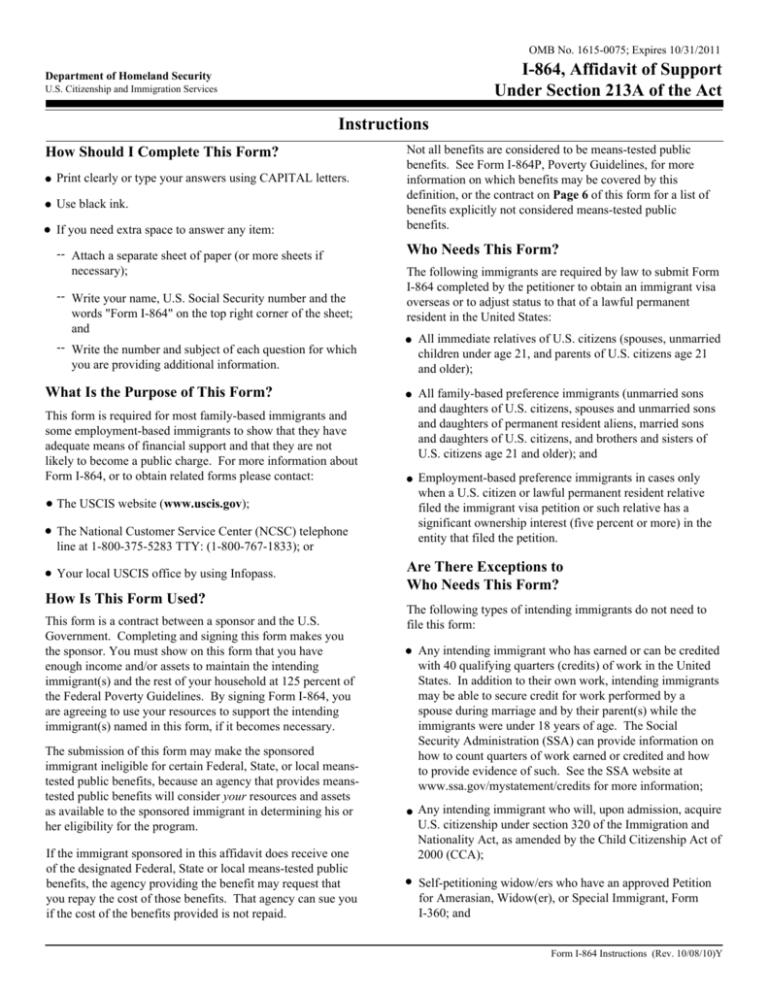
OMB No. 1615-0075; Expires 10/31/2011 I-864, Affidavit of Support Under Section 213A of the Act Department of Homeland Security U.S. Citizenship and Immigration Services Instructions How Should I Complete This Form? Print clearly or type your answers using CAPITAL letters. Use black ink. If you need extra space to answer any item: -- Attach a separate sheet of paper (or more sheets if necessary); -- Write your name, U.S. Social Security number and the words "Form I-864" on the top right corner of the sheet; and -- Write the number and subject of each question for which you are providing additional information. What Is the Purpose of This Form? This form is required for most family-based immigrants and some employment-based immigrants to show that they have adequate means of financial support and that they are not likely to become a public charge. For more information about Form I-864, or to obtain related forms please contact: The USCIS website (www.uscis.gov); The National Customer Service Center (NCSC) telephone line at 1-800-375-5283 TTY: (1-800-767-1833); or Your local USCIS office by using Infopass. How Is This Form Used? This form is a contract between a sponsor and the U.S. Government. Completing and signing this form makes you the sponsor. You must show on this form that you have enough income and/or assets to maintain the intending immigrant(s) and the rest of your household at 125 percent of the Federal Poverty Guidelines. By signing Form I-864, you are agreeing to use your resources to support the intending immigrant(s) named in this form, if it becomes necessary. The submission of this form may make the sponsored immigrant ineligible for certain Federal, State, or local meanstested public benefits, because an agency that provides meanstested public benefits will consider your resources and assets as available to the sponsored immigrant in determining his or her eligibility for the program. If the immigrant sponsored in this affidavit does receive one of the designated Federal, State or local means-tested public benefits, the agency providing the benefit may request that you repay the cost of those benefits. That agency can sue you if the cost of the benefits provided is not repaid. Not all benefits are considered to be means-tested public benefits. See Form I-864P, Poverty Guidelines, for more information on which benefits may be covered by this definition, or the contract on Page 6 of this form for a list of benefits explicitly not considered means-tested public benefits. Who Needs This Form? The following immigrants are required by law to submit Form I-864 completed by the petitioner to obtain an immigrant visa overseas or to adjust status to that of a lawful permanent resident in the United States: All immediate relatives of U.S. citizens (spouses, unmarried children under age 21, and parents of U.S. citizens age 21 and older); All family-based preference immigrants (unmarried sons and daughters of U.S. citizens, spouses and unmarried sons and daughters of permanent resident aliens, married sons and daughters of U.S. citizens, and brothers and sisters of U.S. citizens age 21 and older); and Employment-based preference immigrants in cases only when a U.S. citizen or lawful permanent resident relative filed the immigrant visa petition or such relative has a significant ownership interest (five percent or more) in the entity that filed the petition. Are There Exceptions to Who Needs This Form? The following types of intending immigrants do not need to file this form: Any intending immigrant who has earned or can be credited with 40 qualifying quarters (credits) of work in the United States. In addition to their own work, intending immigrants may be able to secure credit for work performed by a spouse during marriage and by their parent(s) while the immigrants were under 18 years of age. The Social Security Administration (SSA) can provide information on how to count quarters of work earned or credited and how to provide evidence of such. See the SSA website at www.ssa.gov/mystatement/credits for more information; Any intending immigrant who will, upon admission, acquire U.S. citizenship under section 320 of the Immigration and Nationality Act, as amended by the Child Citizenship Act of 2000 (CCA); Self-petitioning widow/ers who have an approved Petition for Amerasian, Widow(er), or Special Immigrant, Form I-360; and Form I-864 Instructions (Rev. 10/08/10)Y Self-petitioning battered spouses and children who have an approved Petition for Amerasian, Widow(er), or Special Immigrant, Form I-360. NOTE: If you qualify for one of the exemptions listed above, submit Form I-864W, Intending Immigrant's I-864 Exemption, instead of Form I-864. Who Completes and Signs Form I-864? A sponsor completes and signs Form I-864. A sponsor is required to be at least 18 years old and domiciled in the United States, or its territories or possessions (see Step-bystep Instructions for more information on domicile). The petitioning sponsor must sign and complete Form I-864, even if a joint sponsor also submits an I-864 to meet the income requirement. The list below identifies who must become sponsors by completing and signing a Form I-864. The U.S. citizen or lawful permanent resident who filed a Form I-130 for a family member, Form I-129F for a fiance(e), or Form I-600 or I-600A for an orphan. The U.S. citizen or permanent resident alien who filed an employment-based immigrant visa petition (Form I-140) for a spouse, parent, son, daughter, or sibling who: (1) has a significant ownership interest (five percent or more) in the business which filed the employment-based immigrant visa petition; or (2) is related to the intending immigrant as a spouse, parent, son, daughter, or sibling. What Are the Income Requirements? To qualify as a sponsor, you must demonstrate that your income is at least 125 percent of the current Federal poverty guideline for your household size. The Federal poverty line, for purposes of this form, is updated annually and can be found on Form I-864P, Poverty Guidelines. If you are on active duty in the U.S. Armed Forces, including the Army, Navy, Air Force, Marines or Coast Guard, and you are sponsoring your spouse or minor child, you only need to have an income of 100 percent of the Federal poverty line for your household size. This provision does not apply to joint or substitute sponsors. How Do I Count Household Size? Your household size includes yourself and the following individuals, no matter where they live: any spouse, any dependent children under the age of 21, any other dependents listed on your most recent Federal income tax return, all persons being sponsored in this affidavit of support, and any immigrants previously sponsored with a Form I-864 or Form I-864 EZ affidavit of support whom you are still obligated to support. If necessary to meet the income requirements to be a sponsor, you may include additional relatives (adult children, parents, or siblings) as part of your household size as long as they have the same principle residence as you and promise to use their income and resources in support of the intending immigrant(s). What If I Cannot Meet the Income Requirements? If your income alone is not sufficient to meet the requirement for your household size, the intending immigrant will be ineligible for an immigrant visa or adjustment of status, unless the requirement can be met using any combination of the following: Income from any relatives or dependents living in your household or dependents listed on your most recent Federal tax return who signed a Form I-864A; Income from the intending immigrant, if that income will continue from the same source after immigration, and if the intending immigrant is currently living in your residence. If the intending immigrant is your spouse, his or her income can be counted regardless of current residence, but it must continue from the same source after he or she becomes a lawful permanent resident. The value of your assets, the assets of any household member who has signed a Form I-864A, or the assets of the intending immigrant; A joint sponsor whose income and/or assets equal at least 125 percent of the Poverty Guidelines. See question below for more information on joint sponsors. How Can My Relatives and Dependents Help Me Meet the Income Requirements? You may use the income of your spouse and/or any other relatives living in your residence if they are willing to be jointly responsible with you for the intending immigrant(s) you are sponsoring. If you have any unrelated dependents listed on your income tax return you may include their income regardless of where they reside. The income of such household members and dependents can be used to help you meet the income requirements if they complete and sign Form I-864A, Contract Between Sponsor and Household Member, and if they are at least 18 years of age when they sign the form. Can the Intending Immigrant Help Me Meet the Income Requirements? If certain conditions are met, the intending immigrant's income can help you meet the income requirement. If the intending immigrant is your spouse, his or her income can be included if it will continue from the same source after he or she obtains lawful permanent resident status. If the intending immigrant is another relative, there are two requirements. First, the income must be continuing from the same source after he or she obtains lawful permanent resident status, and second, the intending immigrant must currently live with you in your residence. Evidence must be provided to support both requirements. Form I-864 Instructions (Rev. 10/08/10)Y Page 2 However, an intending immigrant whose income is being used to meet the income requirement does not need to complete Form I-864A, Contract Between Sponsor and Household Member, unless the intending immigrant has a spouse and/or children immigrating with him or her. In this instance, the contract relates to support for the spouse and/or children. Does Receipt of Means-Tested Public Benefits Disqualify me From being a Sponsor? No. Receipt of means-tested public benefits does not disqualify anyone from being a sponsor. However, meanstested public benefits cannot be accepted as income for the purposes of meeting the income requirement. How Can I Use Assets to Qualify? Assets may supplement income if the consular or immigration officer is convinced that the monetary value of the asset could reasonably be made available to support the sponsored immigrant and converted to cash within one year without undue harm to the sponsor or his or her family members. You may not include an automobile unless you show that you own at least one working automobile that you have not included. What Is a Joint Sponsor? If the person who is seeking the immigration of one or more of his or her relatives cannot meet the income requirements, a "joint sponsor" who can meet the requirements may submit a Form I-864 to sponsor all or some of the family members. A joint sponsor can be any U.S. citizen, U.S. national, or lawful permanent resident who is at least 18 years old, domiciled in the United States, or its territories or possessions, and willing to be held jointly liable with the petitioner for the support of the intending immigrant. A joint sponsor does not have to be related to the petitioning sponsor or the intending immigrant. If the first joint sponsor completes Form I-864 for some rather than all the family members, a second qualifying joint sponsor will be required to sponsor the remaining family members. There may be no more than two joint sponsors. A joint sponsor must be able to meet the income requirements for all the persons he or she is sponsoring without combining resources with the petitioning sponsor or a second joint sponsor. Any dependents applying for an immigrant visa or adjustment of status more than six months after immigration of the intending immigrants must be sponsored by the petitioner but may be sponsored by an original joint sponsor or a different joint sponsor. Even if one or more I-864s are submitted for an intending immigrant, the petitioning sponsor remains legally accountable for the financial support of the sponsored alien along with the joint sponsor(s). What Is a Substitute Sponsor? A substitute sponsor is a sponsor who is completing a Form I-864 on behalf of an intending immigrant whose original I-130 petitioner has died after the Form I-130 was approved, but before the intending immigrant obtained permanent residence. The substitute sponsor must be related to the intending immigrant in one of the following ways: spouse, parent, mother-in-law, father-in-law, sibling, child (at least 18 years of age), son, daughter, son-in-law, daughter-in-law, brotherin-law, sister-in-law, grandparent, grandchild or legal guardian. The substitute sponsor must also be a U.S. citizen or lawful permanent resident. If you are a substitute sponsor, you must indicate that that you are related to the intending immigrant in one of the ways listed above and include evidence proving that relationship. The beneficiary must also file this form along with a written statement explaining the reasons why the Form I-130 visa petition should be reinstated, having been revoked following the petitioner's death. The beneficiary must also include a copy of the Form I-130 approval notice. How Long Does My Obligation as a Sponsor Continue? Your obligation to support the immigrant(s) you are sponsoring in this affidavit of support will continue until the sponsored immigrant becomes a U.S. citizen, or can be credited with 40 qualifying quarters of work in the United States. Although 40 qualifying quarters of work (credits) generally equate to ten years of work, in certain cases the work of a spouse or parent adds qualifying quarters. The Social Security Administration can provide information on how to count qualifying quarters (credits) of work. The obligation also ends if you or the sponsored immigrant dies or if the sponsored immigrant ceases to be a lawful permanent resident and departs the United States. Divorce does not end the sponsorship obligation. Do I Need to Submit a Separate Affidavit for Each Family Member? You must submit a Form I-864 affidavit of support for each intending immigrant you are sponsoring. You may submit photocopies if you are sponsoring more than one intending immigrant listed on the same affidavit of support. Separate affidavits of support are required for intending immigrants for whom different Form I-130 family-based petitions were filed. For instance, if you are sponsoring both parents, each will need an original affidavit of support and accompanying documentation since you were required to submit separate Form I-130 visa petitions for each parent. Form I-864 Instructions (Rev. 10/08/10)Y Page 3 Often a spouse or minor children obtain visas or adjust status as dependents of a relative, based on the same visa petition. If you are sponsoring such dependents, you only need to provide a photocopy of the original Form I-864, as long as these dependents are immigrating at the same time as the principal immigrant or within six months of the time he or she immigrates to the United States. You do not need to provide copies of the supporting documents for each of the photocopied Forms I-864. You should complete and submit Form I-865 to USCIS only when the address you indicated on the original I-864 Affidavit of Support has changed. Please see Form I-865 for further directions on filing the Sponsor's Change of Address. This requirement does not relieve a sponsor who is a lawful permanent resident from submitting Form AR-11 within ten days of a change of address. When Do I Complete Form I-864 and Where Do I Send It? If the intending immigrant will apply for an immigrant visa at a U.S. Embassy or Consulate overseas: Complete Form I-864 when it is mailed to you from the National Visa Center (NVC). Different instructions apply to some cases so follow the instructions provided by the National Visa Center for your particular case. The instructions on when and where to submit Form I-864 are included in the information packet that is mailed to you with Form I-864. Form I-864 and all accompanying documentation must be submitted to the government within one year of when you sign Form I-864. If the intending immigrant will adjust status in the United States: Complete Form I-864 when the intending immigrant is ready to submit his or her Form Application to Register Permanent Residence or Adjust Status. Then give the completed Form I-864 along with any Forms I-864A and all supporting documentation to the intending immigrant to submit with his or her application for adjustment of status. To be valid, Form I-864 and all supporting documentation must be submitted within one year of when you sign Form I-864. For privacy, you may enclose these documents in a sealed envelope marked "Form I-864: To Be Opened Only by a U.S. Government Official." You may be requested to submit updated information if there is a significant delay in processing. Do I Have to Report My Change of Address If I Move? Federal law requires that every sponsor report every change of address to the USCIS within 30 days of the change. To do this, send a completed Form I-865, Sponsor's Change of Address, to the Service Center having jurisdiction over your new address. Do not complete Form I-865 at the same time that you complete the I-864. Form I-864 Instructions (Rev. 10/08/10)Y Page 4 Step-by-Step Instructions Form I-864 is divided into nine parts. The information below will help you fill out the form. Part 1. Basis for Filing Affidavit of Support. Check box "a" if you are the petitioner who is filing or who has already filed Form I-130, Petition for Alien Relative; Form I-600, Petition to Classify Orphan as an Immediate Relative; or Form I-600A, Application for Advance Processing of Orphan Petition. If you are the petitioner, you must sponsor each intending immigrant. Check box "b" if you are filing or have filed Form I-140, Immigrant Petition for Alien Worker, for your husband, wife, father, mother, child, adult son or daughter, brother, or sister. Check box "c" if you have an ownership interest of at least five percent in a business, corporation or other entity that filed or is filing a Form I-140 for your husband, wife, father, mother, child, adult son or daughter, brother, or sister. Check box "d" if you are the only joint sponsor or box "e" if you are either of two joint sponsors. A joint sponsor must be a person, and may not be a corporation, organization, or other entity. A joint sponsor does not have to be related to the intending immigrant. Indicate whether you are the only joint sponsor or one of two joint sponsors. Check with the petitioning sponsor or the intending immigrant if you are not certain. Check box "f" if you are the substitute sponsor. A substitute sponsor is a sponsor who is completing a Form I-864 on behalf of an intending immigrant whose original Form I-130 petitioner has died after the Form I-130 was approved, but before the intending immigrant obtained permanent residence. The substitute sponsor must be related to the intending immigrant in one of the following ways: spouse, parent, mother-in-law, father-in-law, sibling, child (at least 18 years of age), son, daughter, son-in-law, daughter-in-law, brother-in-law, sister-in-law, grandparent, grandchild or legal guardian. The substitute sponsor must also be a U.S. citizen or lawful permanent resident. If you are a substitute sponsor, you must sponsor each intending immigrant. Part 2. Information on the Principal Immigrant. The principal immigrant is the intending immigrant who is the primary beneficiary of the visa petition. 6. Alien Registration Number. An "A-number" is an Alien Registration Number assigned by the former Immigration and Naturalization Service (INS) or U.S. Citizenship and Immigration Services (USCIS). If the intending immigrants you are sponsoring have not previously been in the United States or have only been in the United States as tourists, they probably do not have A-numbers. Persons with A-numbers can locate the number on their INS or USCIS-issued documentation. 8. Indicate whether you are sponsoring the principal immigrant listed in item 2 in this Form I-864. This only applies to cases with two joint sponsors. Check "No" only if you are sponsoring only intended immigrants listed in 9 (a through e) and not the principal immigrant listed in item 2. Part 3. Information on Immigrants You Are Sponsoring. 9. Accompanying Family Members You are Sponsoring. The immigrant you are sponsoring may be bringing a spouse and/or children to the United States. If the spouse and/or children will be traveling with the immigrant, or within six months of the immigrant's entry to the United States and you are sponsoring them, you should list the names and other requested information on the lines provided. If any dependents are not immigrating, will be immigrating more than 6 months after the sponsored alien arrives in the United States, or you are not sponsoring them, do not list their names here. A separate Form I-864 will be required for them when they apply for their immigrant visas. Part 4. Information on the Sponsor. 15. Country of Domicile. This question is asking you to indicate the country where you maintain your principal residence and where you plan to reside for the foreseeable future. If your mailing address and/or place of residence is not in the United States, but your country of domicile is the United States, you must attach a written explanation and documentary evidence indicating how you meet the domicile requirement. If you are not currently living in the United States, you may meet the domicile requirement if you can submit evidence to establish that any of the following conditions apply: Form I-864 Instructions (Rev. 10/08/10)Y Page 5 A. You are employed by a certain organization. 18. U.S. Social Security Number. Some individuals employed overseas are automatically considered to be domiciled in the United States because of the nature of their employment. The qualifying types of employment include employment by: Every sponsor's Social Security number is required by law. If you do not currently have a Social Security number you must obtain one before submitting this Form I-864. -- The U.S. government; 19. Citizenship/Residency. -- An American institution of research recognized by the Secretary of Homeland Security (The list of qualifying institutions may be found at 8 CFR 316.20); Proof of U.S. citizen, national, or permanent resident status is required for joint and substitute sponsors and for relatives of employment-based immigrants who file this form. Petitioning relatives who have already filed proof of their citizenship or immigration status with Forms I-130, Form I-129F, I-600 and I-600A do not need to submit proof of their status with this form. -- A U.S. firm or corporation engaged in whole or in part in the development of foreign trade and commerce with the United States, or a subsidiary of such a firm or corporation; -- A public international organization in which the United States participates by treaty or statute; -- A religious denomination having a bona fide organization in the United States, if the employment abroad involves the person's performance of priestly or ministerial functions on behalf of the denomination; or -- A religious denomination or interdenominational missionary organization having a bona fide organization in the United States, if the person is engaged solely as a missionary. B. You are living abroad temporarily. If you are not currently living in the United States, you must show that your trip abroad is temporary and that you have maintained your domicile in the United States. You can show this by providing proof of your voting record in the United States, proof of paying U.S. State or local taxes, proof of having property in the United States, proof of maintaining bank or investment accounts in the United States, or proof of having a permanent mailing address in the United States. Other proof could be evidence that you are a student studying abroad or that a foreign government has authorized a temporary stay. C. You intend in good faith to reestablish your domicile in the United States no later than the date of the intending immigrant's admission or adjustment of status. You must submit proof that you have taken concrete steps to establish you will be domiciled in the United States at a time no later than the date of the intending immigrant's admission or adjustment of status. Concrete steps might include accepting a job in the United States, signing a lease or purchasing a residence in the United States, or registering children in U.S. schools. Please attach proof of the steps you have taken to establish domicile as described above. Proof of U.S. citizen or national status includes a copy of your birth certificate, certificate of naturalization, certificate of citizenship, consular report of birth abroad to citizen parents, or a copy of the biographic data page of your U.S. passport. Proof of permanent resident status includes a photocopy of both sides of the "green card," Form I-551, Alien Registration Receipt Card/Permanent Resident Card; or a photocopy of an unexpired temporary I-551 stamp in either a foreign passport or a DHS Form I-94, Arrival/Departure Document. 20. Military Service. Check "yes" if you are the petitioning sponsor and on active duty in the U.S. Army, Navy, Air Force, Marines,or Coast Guard, other than for training. If you provide evidence that you are currently on active duty in the military and you are petitioning for your spouse or minor child, you will need to demonstrate income at only 100 percent of the poverty level for your household size, instead of at 125 percent of the poverty level. (See Form I-864P for information on the poverty levels.) Check "no" if you are not on active duty in the U.S. military. This provision does not apply to joint and substitute sponsors. Part 5. Sponsor's Household Size. This section asks you to add together the number of persons for whom you are financially responsible. Some of these persons may not be residing with you. Make sure you do not count any individual more than once, since in some cases the same person could fit into two categories. For example, your spouse (whom you would enter on line 21c) might also be a lawful permanent resident whom you have already sponsored using Form I-864 (line 21f). If you included your spouse on line 21c, do not include him or her again on line 21f. Form I-864 Instructions (Rev. 10/08/10)Y Page 6 21d - Enter the number of unmarried children you have who are under age 21, even if you do not have legal custody of these children. You may exclude any unmarried children under 21, if these children have reached majority under the law of their place of domicile and you do not claim them as dependents on your income tax returns. 21e - Enter the number of any other dependents. You must include each and every person whom you have claimed as a dependent on your most recent Federal income tax return, even if that person is not related to you. Even if you are not legally obligated to support that person, you must include the person if in fact you did support that person and claimed the person as a dependent. 21f - Enter the number of lawful permanent residents whom you are currently obligated to support based on your previous submission of Form I-864 as a petitioning, substitute, or joint sponsor, or of Form I-864EZ as a petitioning sponsor. Include only those persons who have already immigrated to the United States. Do not include anyone for whom your obligation to support has ended through the sponsored immigrant's acquisition of U.S. citizenship, death, abandonment of lawful permanent residence in the United States, acquisition of 40 quarters of earned or credited work in the United States, or obtaining a new grant of adjustment of status while in removal proceedings based on a new affidavit of support, if one is required. You may include evidence supporting your claim about your expected income for the current year if you believe that submitting this evidence will help you establish ability to maintain sufficient income. You are not required to submit this evidence, however, unless specifically instructed to do so by a Government official. For example, you may include a recent letter from your employer, showing your employer's address and telephone number, and indicating your annual salary. You may also provide pay stub(s) showing your income for the previous six months. If your claimed income includes alimony, child support, dividend or interest income, or income from any other source, you may also include evidence of that income. 24. Annual Household Income. This section is used to determine the sponsor's household income. Take your annual individual income from line 23 and enter it on line 24a. If this amount is greater than 125 percent (or 100 percent if you are on active duty in the U.S. military and sponsoring your spouse or child) of the Federal Poverty Guidelines for your household size from line 21h, you do not need to include any household member's income. See Form I-864P for reference on the Poverty Guidelines. To determine the filing requirements for your relatives included in item 24b, follow these instructions: 21g - This question gives you the option of including certain other non-dependent relatives who are living in your residence as part of your household size. Such relatives may include your mother, father, sister, brother or adult children, if they are living in your residence. However, the only reason to include these family members in your household size is if you need to include their income when you calculate your household income for purposes of meeting the income requirement for this form. To be considered, any relative indicated in this category must sign and submit Form I-864A. If you included the income of your spouse listed in 21c, or any child listed in 21d, or any dependent listed in 21e, or any other relative listed in 21g, each one of these individuals must be over 18 years of age and must complete Form I-864A. Part 6. Sponsor's Income and Employment. If you included the income of the intending immigrant who is not your spouse, (he or she would be counted on line 21a), evidence that his or her income will continue from the current source after obtaining lawful permanent resident status must be provided and the intending immigrant must provide evidence that he/she is living in your residence. He or she does not need to complete Form I-864A, Contract Between Sponsor and Household Member, unless he or she has an accompanying spouse or children. 22. Job Classification. Check the box (a through d) that applies to you. 23. Current Individual Annual Income. Enter your current individual earned or retirement annual income that you are using to meet the requirements of this form and indicate the total on this line. If you included the income of the intending immigrant who is your spouse (he or she would be counted on line 21a), evidence that his/her income will continue from the current source after obtaining lawful permanent resident status must be provided. He/she does not need to complete Form I-864A unless he/she has accompanying children. Form I-864 Instructions (Rev. 10/08/10)Y Page 7 25. Federal Income Tax Information. You must provide either an IRS transcript or a photocopy from your own records of your Federal individual income tax return for the most recent tax year. If you believe additional returns may help you to establish your ability to maintain sufficient income, you may submit transcripts or photocopies of your Federal individual income tax returns for the three most recent years. You are not required to have the IRS certify the transcript or photocopy unless specifically instructed to do so by a Government official; a plain transcript or photocopy is acceptable. Telefile tax records are not acceptable proof of filing. Do not submit copies of your State income tax returns. Do not submit any tax returns that you filed with any foreign government unless you claim that you were not required to file a Federal tax return with the United States government and you wish to rely on the foreign return solely to establish the amount of your income that is not subject to tax in the United States. If you provide a photocopy of your tax return(s), you must include a copy of each and every FormW-2 and Form 1099 that relates to your return(s). Do not include copies of these Forms if you provide an IRS transcript of your return(s) rather than a photocopy. If you checked box 22(b) (self-employed), you should have completed one of the following forms with your Federal income tax return: Schedule C (Profit or Loss from Business), Schedule D (Capital Gains), Schedule E (Supplemental Income or Loss) or Schedule F (Profit or Loss from Farming). You must include each and every Form 1040 Schedule, if any, that you filed with your Federal tax return. If you were required to file a Federal income tax return during any of the previous three tax years but did not do so, you must file any and all late returns with IRS and attach an IRSgenerated tax return transcript documenting your late filing before submitting the I-864 Affidavit of Support. If you were not required to file a Federal income tax return under U.S. tax law because your income was too low, attach a written explanation. If you were not required to file a Federal income tax return under U.S. tax law for any other reason, attach a written explanation including evidence of the exemption and how you are subject to it. Residence outside of the United States does not exempt U.S. citizens or lawful permanent residents from filing a U.S. Federal income tax return. See "Filing Requirements" in the IRS Form 1040 Filing Instructions to determine whether you were required to file. For purposes of this affidavit, the line for gross (total) income on IRS Forms 1040 and 1040A will be considered when determining income. For persons filing IRS Form 1040 EZ, the line for adjusted gross income will be considered. Obtaining Tax Transcripts. You may use Internal Revenue Service (IRS) Form 4506-T to request tax transcripts from the IRS. Complete IRS Form 4506-T with the ending date for each of your three most recent tax years listed on line 9. Follow all instructions for completing and filing Form 4506-T with the IRS. Part 7. Use of Assets to Supplement Income. Only complete this Part if you need to use the value of assets to meet the income requirements. If your Total Household Income (indicated on Line 24c) is equal to or more than needed to meet the income requirement as shown by the current Poverty Guidelines (Form I-864P) for your household size (indicated on Line 21h), you do not need to complete this Part. If your total household income does not meet the requirement, you may submit evidence of the value of your assets, the sponsored immigrant's assets, and/or assets of a household member that can be used, if necessary, for the support of the intending immigrant(s). The value of assets of all of these persons may be combined in order to meet the necessary requirement. Only assets that can be converted into cash within one year and without considerable hardship or financial loss to the owner may be included. The owner of the asset must include a description of the asset, proof of ownership, and the basis for the owner's claim of its net cash value. You may include the net value of your home as an asset. The net value of the home is the appraised value of the home, minus the sum of any and all loans secured by a mortgage, trust deed, or other lien on the home. If you wish to include the net value of your home, this, you must include documentation demonstrating that you own it, a recent appraisal by a licensed appraiser, and evidence of the amount of any and all loans secured by a mortgage, trust deed, or other lien on the home. You may not include the net value an automobile unless you show that you have more than one automobile, and at least one automobile is not included as an asset. Form I-864 Instructions (Rev. 10/08/10)Y Page 8 26. Assets. Part 8. Sponsor's Contact. To use your own assets, you must complete lines 26a through 26d and submit corresponding evidence with this form. Supporting evidence must be attached to establish location, ownership, date of acquisition, and value of any real estate holding. Read the contract carefully, print your name, and then sign and date the form. If you do not print your name on line 30 and sign and date the form on line 31, the intending immigrant you are sponsoring cannot be issued a visa or be granted adjustment of status. 27. Household Member's Assets. To use the assets of a relative (spouse, adult son or daughter, parent or sibling), the relative must reside with you and have completed a Form I-864A, Contract Between Sponsor and Household Member, with accompanying evidence of assets. The Form I-864A and accompanying evidence of assets is submitted with Form I-864. You may use the assets of more than one relative who resides with you so long as you submit a complete Form I-864A with evidence of assets for each such relative. 28. Assets of the Intending Immigrant. You may use the assets of the intending immigrant regardless of where he or she resides. The intending immigrant must provide evidence of such assets with this form. Form I-864A is not required to document the intending immigrant's assets. 29. Total Value of Assets. In order to qualify based on the value of your assets, the total value of your assets must equal at least five times the difference between your total household income and the current poverty guidelines for your household size. However, if you are a U.S. citizen and you are sponsoring your spouse or minor child, the total value of your assets must only be equal to at least three times the difference. If the intending immigrant is an alien orphan who will be adopted in the United States after the alien orphan acquires permanent residence, and who will, as a result, acquire citizenship under section 320 of the Act, the total value of your assets need only equal the difference. Example of How to Use Assets: If you are petitioning for a parent and the poverty line for your household size is $22,062 and your current income is $18,062, the difference between your current income and the poverty line is $4,000. In order for assets to help you qualify, the combination of your assets, plus the assets of any household member who is signing Form I-864A, plus any available assets of the sponsored immigant, would have to equal five times this difference (5 x $4,000). In this case, you would meet the income requirements if the net value of the assets equaled at least $20,000. Other Information. Penalties. The Government may pursue verification of any information provided on or in support of this form, including employment, income, or assets with the employer, financial or other institutions, the Internal Revenue Service, or the Social Security Administration. If you include in this affidavit of support any information that you know to be false, you may be liable for criminal prosecution under the laws of the United States. If you fail to give notice of your change of address, as required by 8 U.S.C. 1183a(d) and 8 CFR 213a.3, you may be liable for the civil penalty established by 8 U.S.C. 1183a(d) (2). The amount of the civil penalty will depend on whether you failed to give this notice because you were aware that the immigrant(s) you sponsored had received Federal, State, or local means-tested public benefits. If the failure to report your change of address occurs with knowledge that the sponsored immigrant received meanstested public benefits (other than benefits described in section 401(b), 403(c)(2), or 4ll(b) of the Personal Responsibility and Work Opportunity Reconciliation Act of 1996, which are summarized in the contract in Part 8) such failure may result in a fine of not less than $2,000 or more than $5,000. Otherwise, the failure to report your change of address may result in a fine not less than $250 or more than $2,000. Privacy Act Notice. Authority for the collection of the information requested on this form is contained in 8 U.S.C. 1182a(4), 1183a, 1184(a), and 1258. The information will be used principally by an immigration judge, USCIS or a Consular Officer to support an alien's application for benefits under the Immigration and Nationality Act and specifically the assertion that he or she has adequate means of financial support and will not become a public charge. Submission of the information is voluntary. Failure to provide the information will result in denial of the application for an immigrant visa or adjustment of status. Form I-864 Instructions (Rev. 10/08/10)Y Page 9 The information may also, as a matter of routine use, be disclosed to other Federal, State and local agencies providing means-tested public benefits for use in civil action against the sponsor for breach of contract. Social Security numbers may be verified with the Social Security Administration consistant with the consent signed as part of the contract in Part 8 of the Form I-864. It may also be disclosed as a matter of routine use to other Federal, State, local, and foreign law enforcement and regulatory agencies to enable these entities to carry out their law enforcement responsibilities. USCIS Forms and Information. To order USCIS forms, call our toll-free forms line at 1-800-870-3676. You can also obtain forms and information on immigration laws, regulations and procedures by telephoning our National Customer Service Center at 1-800-375-5283 or visiting our internet website at www.uscis.gov. Use InfoPass for Appointments. As an alternative to waiting in line for assistance at your local USCIS office, you can now schedule an appointment through our internet-based system, InfoPass. To access the system, visit our website at www.uscis.gov. Use the InfoPass appointment scheduler and follow the screen prompts to set up your appointment. InfoPass generates an electronic appointment notice that appears on the screen. Print the notice and take it with you to your appointment. The notice gives the time and date of your appointment, along with the address of the USCIS office. Reporting Burden. A person is not required to respond to a collection of information unless it displays a currently valid OMB control number. We try to create forms and instructions that are accurate, can be easily understood, and which impose the least burden on you to provide us with information. Often this is difficult because some immigration laws are very complex. The estimated average time to complete and file this form is as follows: (1) 75 minutes to learn about the law and form; (2) 90 minutes to complete the form; and (3) 3 hour and 15 minutes to assemble and file the form; for a total estimated average of 6 hours per form. If you have comments regarding the accuracy of this estimate, or suggestions for making this form simpler, write to U.S. Citizenship and Immigration Services, Regulatory Products Division, Office of the Executive Secretariat, 20 Massachusetts Avenue N.W., Washington, D.C. 20529-2020. OMB No. 1615-0075. Do not mail your completed affidavit of support to this address. Form I-864 Instructions (Rev. 10/08/10)Y Page 10 Check List The following items must be submitted with Form I-864: For ALL sponsors: ___ A copy of your individual Federal income tax return, including W-2s for the most recent tax year, or a statement and/or evidence describing why you were not required to file. Also include a copy of each and every Form 1099, Schedule, and any other evidence of reported income. You may submit this information for the most recent three tax years , pay stub(s) from the most recent six months, and/or a letter from your employer if you believe any of these items will help you qualify. For SOME sponsors: ___ If you are currently self-employed, a copy of your Schedule C, D, E or F from your most recent Federal Tax Return which establishes your income from your business. ___ If you are sponsoring more than one intending immigrant listed on the same affidavit of support, photocopies of the original affidavit of support may be submitted for any additional intending immigrants listed. Copies of supporting documentation are not required for these family members. ___ If you are the petitioning sponsor and on active duty in the U.S. Armed Forces and are sponsoring your spouse or child using 100 percent of governing poverty guideline, proof of your active military status. ___ If you are using the income of persons in your household or dependents to qualify, ___ A separate Form I-864A for each person whose income you will use. However, an intending immigrant whose income is being used needs to complete Form I-864A only if his or her spouse and/or children are immigrating with him or her. ___ Proof of their residency in your household and relationship to you if they are not the intending immigrants or are not listed as dependents on your Federal income tax return for the most recent tax year. ___ Proof that the intending immigrant's current employment will continue from the same source if his or her income is being used. ___ A copy of their individual Federal income tax return, including W-2s and 1099s, for the most recent tax year, or evidence that they were not required to file. You may submit this information for the most recent three years if you believe it will help you qualify. ___ If you use your assets or the assets of a household member to qualify, ___ Documentation of assets establishing location, ownership, date of acquisition and value. Evidence of any liens or liabilities against these assets. ___ A separate Form I-864A for each household member using assets other than for the intending immigrant. ___ If you are a joint sponsor, substitute sponsor, or the relative of an employment-based immigrant requiring an affidavit of support, proof of your citizenship status, U.S. national status or lawful permanent resident status. ___ For U.S. citizens or nationals, a copy of your birth certificate, passport, or certificate of naturalization or citizenship. ___ For lawful permanent residents, a copy of both sides of your Form I-551, Permanent Resident Card. Form I-864 Instructions (Rev. 10/08/10)Y Page 11
